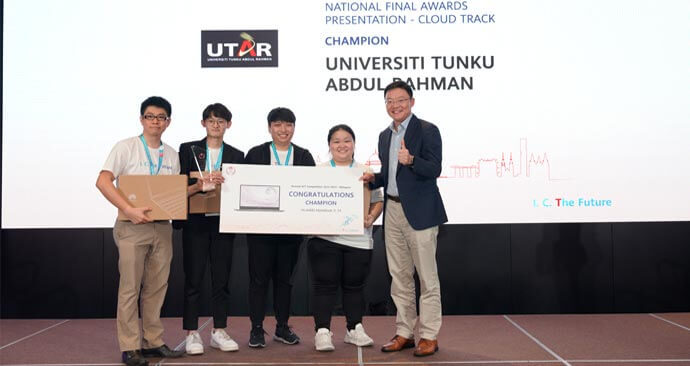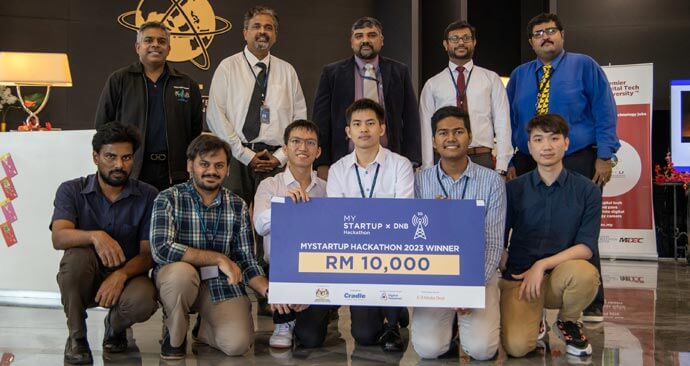Miri – 2 November 2021 – Curtin University’s annual Curtinnovation Awards celebrate its commitment to transforming exceptional research at the university into new products and services that benefit the community nationally and globally. They showcase the scope, breadth and depth of the research conducted across the university, including at its global campuses in Malaysia, Dubai, Singapore and Mauritius.
This year, leading research projects were recognised in six different categories – Science and Engineering, Health Sciences, Business and Law, Humanities, Learning and Teaching, and International.
‘AgriSmartEye’, a reliable, low-cost method to analyse black pepper designed by a research team at Curtin University Malaysia (Curtin Malaysia) comprising Associate Professor Agus Saptoro and Terence Chia Yi Kai was named winner in the International category. Associate Professor Agus is Curtin Malaysia’s Deputy Dean of Research and Development and Director of the Curtin Malaysia Graduate School, while Chia is a PhD student.

Assoc. Prof. Agus and Chia prepare black pepper sample for analysis.
Black pepper is an important agricultural commodity in Sarawak, contributing to more than 95 per cent of Malaysia’s pepper industry. As a premium product sold internationally, it is important to ensure that it is sold as a pure, unadulterated product without added bulk contaminants. Furthermore, existing methods to maintain and improve the quality of the pepper are time-consuming and uneconomical.
This prompted Associate Professor Agus and Chia to propose a rapid, reliable and cost-effective screening tool that combines hyperspectral imaging technologies with deep learning artificial neural networks (DLANN) to detect not only adulterants but also the chemical properties and origin of black pepper samples.
Preliminary research and lab testing was funded by Sarawak Digital Economy Corporation Berhad (SDEC), and current partners in technological development and prototyping include Malaysia Technology Development Corporation, SDEC and the Malaysian Pepper Board. Potential users of the tool will be local producers, traders and regulatory bodies such as the Malaysian Pepper Board.
Curtin Malaysia’s Pro Vice-Chancellor, President and Chief Executive, Professor Simon Leunig, said the impact of AgriSmartEye will be significant given that it is the first screening tool to apply combined hyperspectral imaging and DLANN.
“It is a new method of analysis. The technology is fast with chemical analysis and geographical origin tracing taking under three minutes and is almost 100 per cent accurate. With such a system, the local black pepper industry and regulatory bodies will be able to rapidly, accurately and cost-effectively monitor product quality and ensure customer safety,” he said, adding that it can also be adapted for other products that are prone to adulteration such as coffee, cocoa, sago and vanilla.
Professor Leunig also congratulated Associate Professor Agus and Chia on their win, saying they had done Curtin Malaysia exceptionally proud by helping it win its very first Curtinnovation Award.
The other winning teams were from the main campus in Perth. Winning in the Faculty of Science and Engineering category was the team behind the ‘VetChip’, which included Dr. Garnett Hall and Dr. Maxwell Hall from Fremantle Animal Hospital, as well as Curtin engineering alumni Zyrus Khambatta, Ross Khambatta, Pendar Dalili and Dilesh Wadia.

Assoc. Prof. Agus and Chia working with AgriSmartEye in their lab.
VetChip is a smart microchip that monitors the health of pets and livestock and is believed to be the first of its kind in the world. It is placed under the skin of dogs, cats, horses and other livestock, features tiny sensors that report on an animal’s heart rate, temperature, respiratory rate, stress levels, location and activity, with that information then relayed to the animals’ owners or veterinary staff via a smartphone app.
Winner in the Faculty of Health Sciences category was a team comprising Dr. Matt Oldakowski, Intan Oldakowska, Associate Professor Peter Santa Maria and Dr. Paul Bumbak for ‘EarBuddy’, an inexpensive, non-invasive device for treating children with chronic ear infections. The device drains the middle-ear fluid, avoiding the need for surgery. Resembling a sippy cup, it contains a nasal interface that senses when a child swallows and delivers a gentle puff of air into the nasal cavity, which releases the trapped fluid.
In the Faculty of Business and Law category, the winners were Associate Professor Vidyasagar Potdar, Associate Professor Amy Tian, Jason Luppnow and Ash Roberts, who devised a mobile app that can help law enforcement officers identify offenders quickly just from their marks, scars and tattoos. It captures and annotate images of suspects and records the location, scale, colour and description of their unique markings. It also includes a search engine to identify possible offenders that match a text description or a physical image.

The AgriSmartEye system – fast and accurate.
‘VIT∞Ls’, a virtual training platform designed to help learners understand difficult concepts, helped the team comprising Dr. Rima Caccetta, Associate Professor Lisa Tee, Associate Professor Francesco Mancini, Jonathan Pillai, Justin Owen, Associate Professor Aneesh Krishna and Matt Reed win in the Faculty of Humanities category. VIT∞Ls allows teachers to scaffold learning material, whereby learning materials from different areas and levels of a course are incorporated into one simulation. The platform is designed primarily for teaching and training in pharmacology, medicine, nursing, paramedicine and other biomedical sciences.
Winners in the Learning and Teaching category were medical, education and public health experts Felicity Roux, Kammi Rapsey, Alexei Tsallis, Professor Sharyn Burns, Dr. Jacqui Hendriks and Dr. Jun Chih for ‘My Vital Cycles’, a learning programme created to increase education about menstrual health and help students better understand their bodies. My Vital Cycles comprises activities, videos and interactive workbooks that can be embedded into the school curriculum to help students make informed health decisions throughout their lives.
Curtin University Deputy Vice-Chancellor Research Professor Chris Moran congratulated all the winners at a Curtinnovation Awards ceremony held in Perth recently, saying there had never been a more important time for innovation to thrive.
“The Curtinnovation Awards support the translation of outstanding research into new commercial opportunities, products and services, and I am delighted with the calibre of research acknowledged among this year’s winners,” Professor Moran said.
Among those attending the ceremony was Curtin Malaysia’s Pro Vice-Chancellor, President and Chief Executive, Professor Simon Leunig.
More information on Curtin Malaysia can be found on its website at curtin.edu.my. You can also engage with Curtin Malaysia via Facebook, Twitter, Instagram, YouTube and LinkedIn (Curtin Malaysia).













